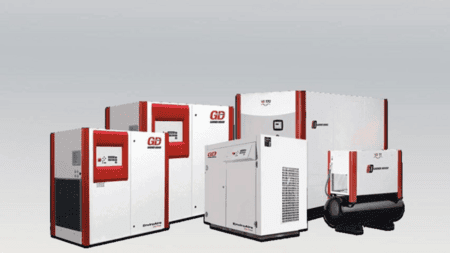Air compressors play an integral role in a wide range of applications in the packaging, automotive, textiles, food and beverage, and electronics industries. Their versatility makes them commonplace in many job sites, with a variety of options available depending on each application’s unique requirements.
The two main types of air compressors are oil-free and oil-lubricated air compressors, and knowing how each type works will help you make the right selection.
What Is an Oil-Free Air Compressor?
Oil-free air compressors use an alternative to oil for lubricating the compression system. While these systems still involve oil, it isn’t used as a lubricant and thus doesn’t make contact with the compressor, so there is no risk that the oil will contaminate the compressed airflow. Oil contamination can harm sensitive equipment or compromise the integrity of manufactured products.
In place of oil, many oil-free air compressors use self-lubricated cylinders, water, or intercoolers for lubrication, sealing, and cooling operations. Industries that rely on oil-free air compressors to protect their processes from contamination include:
- Food and beverage
- Pharmaceutical
- Medical
- Power generation
- Chemical
Oil-Free Air Compressors vs. Oil Air Compressors
If you need an air compressor for your application, both types of compressors have certain features to keep in mind beyond their use of oil. They have different functions, benefits, and applications that make it important to choose the right model.
Oil-Free
Oil-free air compressors come with several advantages over oil air compressors. Generally, oil-free air compressors produce better air quality for applications that require it. Additionally, they don’t require as much maintenance, making them capable of functioning at lower costs.
Oil-Lubricated
Oil-lubricated models are often larger and have a larger air capacity than oil-free compressors. These benefits enable multiple users to power several tools simultaneously from a single compressor.
When considering either type of air compressor, take the following aspects into account:
- Air quality concerns — The best air compressors to use for superior air quality are oil-free, as they pose zero risk of contamination.
- Cost — Oil-free compressors require less energy to run and minimize the risk of leakage, leading to reduced energy expenses and maintenance costs. Although oil-lubricated compressors pose a higher upfront cost and require regular oil changes, they offer a longer service life than oil-free compressors.
- Electricity availability — Oil-free compressors require less energy to operate, which is why they’re best to use in facilities with limited electricity availability.
Featured Oil-Free Air Compressors
Depending on your needs, we offer a variety of oil-free air compressors in Massachusetts.
Oil-Free Air Compressors in Massachusetts From Energy Machinery, Inc.
If you need a high-quality oil-free air compressor for your application, turn to Energy Machinery, Inc. We’ll help you find the ideal system to provide consistent air purity and reliability for your application.
For more information on Energy Machinery’s oil-free air compressors, contact us today. You can also complete our online form to request information about any of our products.








